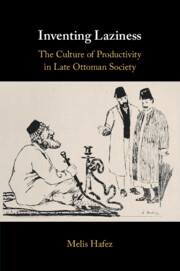Book contents
- Inventing Laziness
- Inventing Laziness
- Copyright page
- Contents
- Figures
- Preface
- Acknowledgments
- A Note on Translations and Transliteration
- Introduction
- 1 Moralizing Productivity in the Age of Reform
- 2 Criminalizing Laziness
- 3 Imagining Ottoman Dandies and Industrious Effendis
- 4 Militarizing the Productive Body
- 5 Exclusionism at Work
- Epilogue
- Bibliography
- Index
Epilogue
Published online by Cambridge University Press: 10 December 2021
- Inventing Laziness
- Inventing Laziness
- Copyright page
- Contents
- Figures
- Preface
- Acknowledgments
- A Note on Translations and Transliteration
- Introduction
- 1 Moralizing Productivity in the Age of Reform
- 2 Criminalizing Laziness
- 3 Imagining Ottoman Dandies and Industrious Effendis
- 4 Militarizing the Productive Body
- 5 Exclusionism at Work
- Epilogue
- Bibliography
- Index
Summary
The Ottoman Empire’s transition into more narrowly defined nation-states after World War I introduced new facets to the already established culture of productivity. Focusing mainly on the Republic of Turkey, the Epilogue raises several issues about the relationship between the culture of productivity, the exclusionary discourses and practices that developed with it in the long nineteenth century, and the reforms implemented by nation-states in the post-Ottoman Middle East. The Turkish Republic imposed drastic sociopolitical reforms, including the displacement and termination of several post-Ottoman institutions and social groups, including seminary schools, Sufi lodges, and the Muslim scholarly class (ulema). Even elements of Ottoman high culture did not escape culpability. In the 1930s, with the belief that it induced lethargy, Ottoman-style music was banned from the public radio. Behind the justification and implementation of such radical reforms in the Turkish Republic stood a century-old unexplored history of the modern anxiety about the productivity of every citizen in the age of nation-states.
Keywords
- Type
- Chapter
- Information
- Inventing LazinessThe Culture of Productivity in Late Ottoman Society, pp. 249 - 253Publisher: Cambridge University PressPrint publication year: 2021



